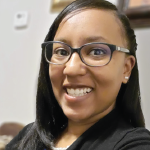
Focus and Blur / shutterstock.com
As a health educator at Integrative Rheumatology, a private practice in Charlotte, N.C., Latisha Williams, MPH, CHES, CHC, works with patients to teach them how to better manage their disease.
In the two-and-a-half years that Ms. Williams has worked at Integrative Rheumatology, she’s answered countless questions about exercise, nutrition and complementary therapies, among other topics. “Patients are looking for ways to reduce pain that go beyond just taking medications,” she says. “They want to reduce inflammation, and are looking for nutrition tips, exercises and alternative therapies that will help them reduce symptoms, such as chronic pain and stiffness, and improve their quality of life.”
According to one study, health educators can help physicians grow their practices and improve patient satisfaction. The study found adding a health educator to your existing staff can also generate additional net revenue, improve patient care and help lead the practice into the future of population management and quality improvement.1

Ms. Williams
“Most patients want to understand how they can do more and improve their condition without hurting themselves,” says Ms. Williams. “They want to learn more about their disease state, and we can put them in touch with physical therapists, nutritionists and other resources to help with the non-medical aspects of their care.”
However, most rheumatology practices don’t have a dedicated health educator on staff, according to Ms. Williams, and even in hospital settings, health educators typically split their time between different departments.
The Rheumatologist recently spoke with several health educators to learn how they work with rheumatologists to achieve quality outcomes and provide excellent care to patients with rheumatic diseases.
Meeting Patients’ Ongoing Needs
Caitlyn Bednarek, MEd, CHES, director of patient education and advocacy, Low Country Rheumatology, a member of Articularis Healthcare Group, views her role as that of a patient liaison and advocate.
“Physicians, unfortunately, don’t always have the time to sit down with a patient to address all of their questions or develop a step-by-step action plan,” says Ms. Bednarek.

Ms. Bednarek
Studies show that providing information to patients with rheumatic diseases helps them better manage their condition. A poster presented at the 2019 12th Annual Rheumatology Nurses Society Conference found that although two-thirds of patients seek health information primarily from their healthcare provider, physicians scored lowest in terms of accessibility and communication. In addition, 57% of patients reported their physician had not recommended any resources to them.2
Another 2019 study found patients with rheumatoid arthritis (RA) who received patient education interventions documented significant improvements in behavior, pain and disability.3
To complement the information provided by the rheumatologist, Ms. Bednarek has developed patient education materials that physicians can give to their patients or direct them to. The practice’s patient education categories include preparing for an appointment, nutrition (supplements and weight loss) and presc-riptions (both oral and injectable).
Ms. Bednarek also implements a group session for patients every year, just before Medicare enrollment deadlines, to answer basic Medicare questions and provide information for patients to consider when selecting a plan, such as long- and short-term costs, what prescription drugs are covered, etc.



